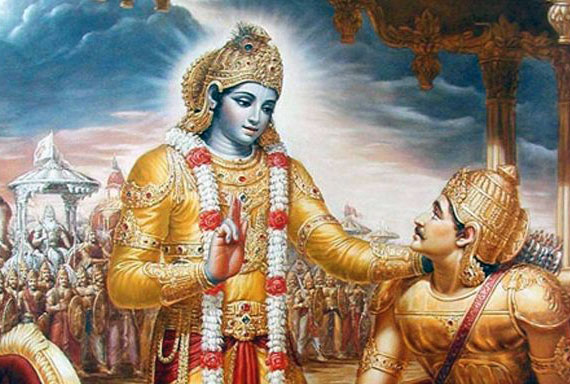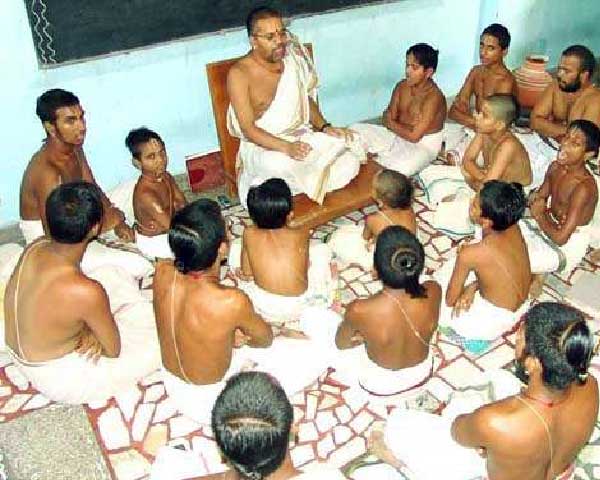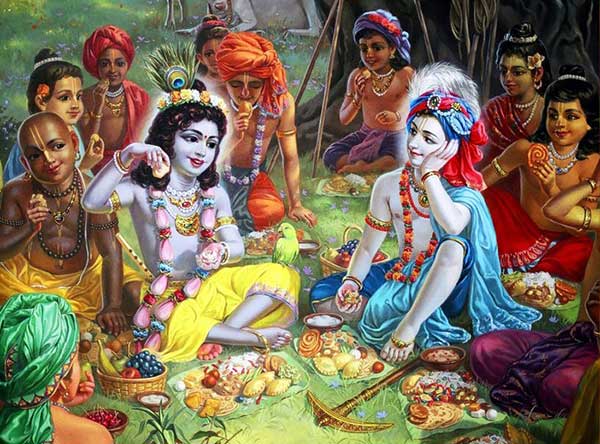Bhagavad Gita Essay (Winner 2015 National University Competition)
In 2015, Padma won the first national Bhagavad Gita Essay Competition, organised by the disciples of HH Bhakti Caru Maharaja. The competition was open to all university-enrolled students across Australia.
The essay question that everyone had to respond to was:
“It is the year 2050 and a united, peace-loving world government has been formed. The leaders of that government have decided to implement Krishna’s strategy for peace and happiness in the world.
You have been asked to succinctly summarise and promote Krishna’s message in a convincing pamphlet that motivates obstinate elements in the population (who ate attached to the former failed system) to implement these teachings in their lives and societies.”
Krishna’s Strategy for Peace and Happiness in the World
by Dr Helena Ellinor Widolf (Padma Devi Dasi)

Lord Krishna, the Supreme Personality of Godhead, imparts transcendental knowledge to His friend Arjuna
Introduction
Krishna’s strategy for peace and happiness in this world is to make as many people as possible conscious of Him as their Supreme Lord, their dear-most friend and their best well-wisher. Krishna recommends this formula for all societies striving to achieve peace and happiness, regardless of which country or even which planet they belong to. By developing Krishna consciousness, the individual spiritual soul will automatically lose its desires to enjoy material life, which underpin all obstinate elements that cause misery and suffering. In Bhagavad-gita As It Is (Prabhupada, 1989) Krishna Himself declares:
One who is not connected with the Supreme [in Krishna consciousness] can have neither transcendental intelligence nor a steady mind, without which there is no possibility of peace. And how can there be any happiness without peace? (Prabhupada, 1989, 2.66)
This verse represents Krishna’s message for those who want to achieve peace and happiness, and is promoted in this essay as encapsulating His strategy for this purpose. To be connected with the Supreme Lord means to maintain firm faith in Him and to act according to His recommendation, which is primarily to place Him in the center of all activity. By establishing spiritual principles and by teaching the population how to engage in devotional service for Lord Krishna, our world government will certainly be able to create a social milieu of happiness in the population. This essay presents a 4-Stage Plan for achieving this goal: (1) raising the consciousness of the population, (2) offering educational courses in Krishna consciousness, (3) providing training programs in devotional service, and (4) ongoing monitoring of the spiritual progress of the population.
Body
Krishna, Krishna, Krishna! One must become Krishna conscious to be peaceful and happy. This is taught by Krishna Himself and is further elucidated by His Divine Grace Srila A.C. Bhaktivedanta Swami Prabhupada in his Bhagavad-gita As It Is (1989, 4.40, 5.6, 5.21, 5.24, 6.27). This simple but pertinent teaching is also expounded in other prominent Vedic literature such as the Narada panca-ratra:
By concentrating one’s attention on the transcendental form of Krishna, who is all-pervading and beyond time and space, one becomes absorbed in thinking of Krishna and then attains the happy state of transcendental association with Him. (in Prabhupada, 1989, 6.31)
By associating with Krishna, living beings can purify their consciousness to the point at which all their material interests are vanquished. This state of consciousness is known as the brahma-bhuta stage and is experienced by liberated souls who are free from the entanglement of mundane life (Prabhupada, 1987, 4.30.20). The devotee of Krishna, however, is not preoccupied with attaining liberation from the material world, but rather desires to develop pure love for Krishna, regardless of whether the devotee is situated within the material or spiritual atmosphere. As the relationship between Krishna and His devotee progresses, the devotee automatically becomes eligible for liberation from repeated birth and death within the arduous and confronting material energy (Prabhupada, 1970, 1.21.187). The peace and happiness experienced by such souls is far superior to any pleasure gained within the material realm. For this reason, the sanctity that every spiritual soul craves is to be found in the performance of loving service for the Supreme Lord.
As a devotee engages in devotional service for the Supreme Lord, they gradually come to realise their true position as an eternal assistant in the Lord’s transcendental pastimes. They thereby loose interest in their own material goals, as well as those of others. Out of His intense love for His devotee, the Lord reciprocates this loving service and gives His devotee further opportunities to serve Him personally. He also reduces the suffering of His devotee who is still situated within the material world. Through these loving exchanges, Krishna is realised by the devotee as being not just the supreme creator and supreme controller, but also as being their best and most intimate well-wisher:
This devotional service is natural because Lord Visnu, the Supreme Personality of Godhead, is the most beloved, the master of the soul, and the well-wisher of all other living beings. (Prabhupada, 1987, 7.6.2)

Figure 2: Devotional service performed for the pleasure of the Supreme Lord, takes many different forms.
Thereby, the devotee of the Lord increasingly receives better and better facility for perfecting their devotional service. This facility is far superior in quality compared to any facility offered the individual by the material energy (Prabhupada, 1972). It is on this point that our world government must act. Krishna reassures us throughout the Bhagavad-gita that He will reciprocate any loving service performed for Him, which will in turn alleviate the tumult and unhappiness that currently permeates our world. This is His promise to all citizens within our global population and must be taken seriously by the leaders of our global society. Srila Prabhupada states that only devotional service “can award peace to the human being” (1989, 5.29) and that “happiness means being in Krishna consciousness” (1993, Chapter 5). It thereby becomes the duty of our world leaders to ensure that all citizens are engaged in performing devotional service and that Krishna remains fixed as “the central figure of creation and of enjoyment” (Prabhupada, 1989, p.13) within all societal sectors.
To further this point, Srila Prabhupada gives the following analogy in the Introduction to Bhagavad-gita As It Is (1989). He explains that in order for different bodily parts to be nourished, food must be fed to the stomach. Trying to feed the leg, the arm, the hand etc. directly does not work. Only the stomach knows how to nourish the different bodily parts. Similarly, in order for different societal sectors to flourish and ably support citizens, the Supreme Lord, who is the nourisher of all souls, must be satisfied: “we, as subordinate living beings, are meant to cooperate to satisfy Him” (Prabhupada, 1989, p.13).
Obstinate elements that interfere with our global populations’ willingness to dedicate their time to developing Krishna consciousness, spring from the influence of false ego. False ego causes the individual to identify with their own material body and to think that they belong in the material world. This condition leads the living being to indulge in stimulating their own material senses to the point at which they dedicate their whole life to furthering their own pleasures within mundane life. Engaging in all types of sense gratification, the living being considers their own desires and goals, rather than the desires and goals of the Supreme Lord, as being the central point in their life. In order to remove these obstinate elements from the materially-embodied population and to bring citizens to the point at which they will enthusiastically engage in devotional service for the Supreme Lord, it is recommended that our world government implement the following 4-Stage Plan:
Stage I: Raising the consciousness of the population
The first and foremost principle is to raise the consciousness of the population from being absorbed in the lower modes of material nature, namely passion and ignorance, to being situated in goodness. Srila Prabhupada states that “When the mode of goodness is developed, people will see things as they are” (1989, 14.17). In order to achieve this, certain restrictions must be enforced within society. These restrictions are described as “principles of renunciation” (Prabhupada, 1987, 3.20.53) and will inspire citizens to strive after spiritual goals rather than material goals:
… if a certain percentage of the population develops Krishna consciousness and becomes situated in the mode of goodness, then there is the possibility for peace and prosperity all over the world. Otherwise, if the world is devoted to the modes of passion and ignorance, there can be no peace or prosperity (Prabhupada, 1989, 14.17).
Core restrictions include:
- No illicit sexual engagement. Sex outside the sanctity of marriage must be prohibited in order to maintain cleanliness and chastity amongst the population;
- No eating of any type of meat, fish or eggs by human citizens. Vegetarian foodstuffs only are permitted for humans, as a meat-based diet destroys the quality of compassion;
- No taking of any type of intoxication. Drugs, alcohol, cigarettes, coffee, tea etc. are forbidden substances for citizens. Indulgence in any of these destroys citizens’ ability to live austerely, which is a requirement for civilized human life; and
- No gambling. Gambling destroys the quality of honesty and must therefore be banned.
(Prabhupada, 1989, 4.26; 16.10; Prabhupada, 1987, 3.20.53)
Stage II: Offering Educational Courses in Krishna Consciousness
It will be necessary to educate the global population about Krishna’s identity as the Supreme Lord and to teach citizens about the eternally-existing relationship shared by Krishna as the Supreme Soul and themselves as subordinate souls. Without this knowledge, citizens will fail to value being asked to engage in devotional service for Krishna. The table below lists scriptural principles considered fundamental for developing educational courses in Krishna Consciousness.
TABLE 1: Foremost Scriptural Principles for Educational Courses in Krishna Consciousness
| Devotional Principle |
Corresponding Verse in Bhagavad-gita As It Is (Prabhupada, 1989) | Additional supporting verses | |
| 1 | Krishna is the Supreme Lord and He is the source of all creation. He is the cause of all causes and the primeval Lord. | I am the source of all spiritual and material worlds. Everything emanates from Me. The wise who perfectly know this engage in My devotional service and worship Me with all their hearts. (10.8) | Prabhupada, 1989, 7.3-13, 9.18, 10.2, 10.4-6, 10.15, 10.20, 10.39, 10.42 |
| 2 | All living beings, regardless of species, are part and parcel of Krishna and are of the same spiritual nature as Him. Due to being contaminated by the material energy, they suffer within the material world. | The living entities in this conditioned world are My eternal fragmental parts. Due to conditioned life, they are struggling very hard with the six senses, which include the mind. (15.7) | Prabhupada, 1989, 2.20, 4.35, 9.17, 10.6, 14.3-4, 18.20 |
| 3 | Whilst in the material world, the pure spiritual soul is covered by the material energy. This causes them to forget their spiritual identity and their relationship with Krishna. |
Thus the wise living entity’s pure consciousness becomes covered by his eternal enemy in the form of lust, which is never satisfied and which burns like fire. (3.39) | Prabhupada, 1989, 3.38-40;Prabhupada, 1987, 3.26.14, 6.17.21, 11.25.15 |
| 4 | A living being must abandon their desires for enjoying their bodily senses. It is this desire that perpetuates their illusion that they are identical with their material body, rather than with their spiritual soul. | There are principles to regulate attachment and aversion pertaining to the senses and their objects. One should not come under the control of such attachment and aversion, because they are stumbling blocks on the path of self-realization. (3.34) | Prabhupada, 1989, 2.55, 2.58-64, 2.71, 3.16, 3.27-28, 3.43, 5.23, 5.26, 6.24, 13.30, 15.9, 16.16, 18.51-53 |
| 5 | In learning how to control their material senses, citizens will cease their association with the material modes of passion and ignorance, and become situated in goodness. They will thenceforth begin to understand greater knowledge, including the existence of a higher spiritual nature. |
O sinless one, the mode of goodness, being purer than the others, is illuminating, and it frees one from all sinful reactions. Those situated in that mode become conditioned by a sense of happiness and knowledge. (14.6) | Prabhupada, 1989, 14.11, 14.17;Prabhupada, 1987, 11.25.2-5, 11.25.10, 11.25.13, 11.25.16 |
| 6 | From the mode of goodness the individual can perform regulated religious duties and study the Vedic scriptures. Citizens will thereby progressively understand the importance of engaging in devotional service for Krishna. |
Persons who have acted piously in previous lives and in this life and whose sinful actions are completely eradicated are freed from the dualities of delusion, and they engage themselves in My service with determination. (7.28) | Prabhupada, 1989, 12.13-14, 12.20, 18.54;Prabhupada, 1987, 11.13.6, 11.19.25 |
| 7 | Ongoing engagement in devotional practices will advance the devotee in Krishna consciousness. Their relationship with Krishna will deepen and take on more meaning. Their love for Krishna will increase. They will increasingly experience peace, happiness and tranquility. | But those who worship Me, giving up all their activities unto Me and being devoted to Me without deviation, engaged in devotional service and always meditating upon Me, having fixed their minds upon Me, O son of Prtha—for them I am the swift deliverer from the ocean of birth and death. (12.6-7) |
Prabhupada, 1989, 5.12, 6.47, 12.8-10, 12.13-20, 18.55-58, 18.65-66 |
After undertaking educational courses in Krishna consciousness, citizens will be encouraged to engage in devotional service that is best suited to their personal natures in terms of bodily, mental and intellectual constitution. Stage III is intended to facilitate different types of training programs for this purpose:
Stage III: Providing Training Programs in Devotional Service
Our world government must design and inaugurate training programs as to how different sectors of society can transform ordinary work activities into devotional service activities. These training programs must be based on devotional principles presented in authorized Vedic texts such as Bhagavad-gita As It Is (Prabhupada, 1989). Primarily, heads of both public and private sector organisations will be presented with a variety of programs aimed at replacing current mundane work-place precepts, with principles of devotional service. The underlying devotional principle is that Krishna, as the Supreme Lord is the actual proprietor of all bodies and must therefore be offered the results of all activity carried out by all living beings. Work must be performed for the pleasure of Krishna. When the fruits of work are offered to Krishna with love and devotion, the worker becomes situated in transcendence. In such a state of mind work can be carried out peacefully, happily and steadily. The following verses in the Bhagavad-gita clearly state that there exists a sharp difference between working for mundane purposes and working for the pleasure of the Supreme Lord:
One who is in knowledge of the Absolute Truth, O mighty-armed, does not engage himself in the senses and sense gratification, knowing well the differences between work in devotion and work for fruitive results. (Prabhupada, 1989, 3.28)
and also in Srimad Bhagavatam:
All occupational engagements are certainly meant for ultimate liberation. They should never be performed for material gain. Furthermore, according to sages, one who is engaged in the ultimate occupational service should never use material gain to cultivate sense gratification. (Prabhupada, 1987, 1.2.9)
Training programs will be designed to accommodate four different social orders as described in Bhagavad-gita As It Is (Prabhupada, 1989, 18.41-45):
- brahmanas: priests, teachers, educators
- ksatriyas: administrators, rulers, military personnel
- vaisyas: mercantile personnel, producers, business personnel
- sudras: labourers, assistants

Figure 3: Brahmanas disseminate Vedic knowledge and set an example for students by living according to the teachings they impart.
Government representatives must themselves live by the principles of devotional service that they desire to instill in the population, so as to set a good example for them. Our world government will thereby progressively develop social policies that have sprung from a devotional culture and that are specifically intended to please the Supreme Lord.
Stage IV: Ongoing Monitoring of Spiritual Progress
Training Programs in Devotional Services need to be regularly monitored in order for our government to assess how citizens are responding to programs. By continuous supervision of the development of training programs and adjustments being made where necessary, obstinate elements born of false ego will gradually decrease. Once citizens gain a thorough understanding of their intrinsic constitutional position as loving servants of Krishna, they will become situated in a state of peace and happiness. Their devotional service for Krishna will deepen and take on more meaning for themselves and also for others, as they strive to please Him with their activities.
In Bhagavad-gita Lord Krishna imparts one more teaching that is vitally important for societies desiring to achieve world-peace and happiness. We learn from the second chapter (Prabhupada, 1989, 2.12-25, 14.16) that all living beings, from the microscopic bacteria to the celestial demigod, are spiritual by nature and are equally a part of the Supreme Lord. Animals and plants are thereby also world citizens and must be considered by governments striving for harmony and prosperity in society:
Animals are also citizens of the land in which they happen to be born, and they also have the right to continue their existence at the cost of the Supreme Lord. (Prabhupada, 1987, 4.21.22)
An obstinate element in the form of exploitation of other species of life on behalf of humans is one of the main causes of unhappiness in our current population. Human populations must thereby act responsibly towards all populations in order to maintain peace and happiness. Such an achievement, however, is only possible when Krishna is accepted as being “the central pivot of living beings” (Prabhupada, 1987, 1.2.6) and “the central point of all relationships” (Prabhupada, 1996, 6.178):
Conclusion
This essay has argued that peace and happiness can only be established within global society if the population becomes Krishna conscious. This argument has been presented as being Krishna’s own strategy for achieving this goal. Specifically, devotional service performed for Lord Krishna has been presented as the only means by which the materially-embodied soul can permanently free itself from the clutches of the harsh material energy. This essay has presented a 4-Stage Plan by which members of global society can purify their consciousness, put an end to their association with the lower modes of material nature and increasingly become engaged in performing devotional service for Krishna. The importance of global society accepting non-human living beings as also being world citizens has also been discussed.
References
- Prabhupada, A.C.Bhaktivedanta Swami, 1970, The Nectar of Devotion, BBT: Los Angeles.
- 1972, Krsna Consciousness: The Topmost Yoga System, BBT: Los Angeles.
- Letter to Mahatma, Sydney, 1972.
- 1987, Srimad Bhagavatam, BBT: Los Angeles.
- 1989, Bhagavad-gita As It Is, BBT: Los Angeles.
- 1993, The Path of Perfection, BBT: Los Angeles.
- 1996, Caitanya Caritamrita, BBT: Los Angeles.
- 2006, Teachings of Queen Kunti, BBT: Los Angeles.
Tables
- Table 1: Foremost Scriptural Principles for Educational Courses in Krishna Consciousness
Figures
- Figure 1: Lord Krishna, the Supreme Personality of Godhead, imparts transcendental knowledge to His friend Arjuna. (painting credit: Krishna.com)
- Figure 2: Devotional service performed for the pleasure of the Supreme Lord, takes many different forms. (photo credit: Helena Widolf)
- Figure 3: Brahmanas disseminate Vedic knowledge and set an example for students by living according to the teachings they impart. (photo credit: unknown source)
- Figure 4: “With Krishna in the center, everything becomes beautiful” (Prabhupada, 2006, 22) (painting credit: Krishna.com)
